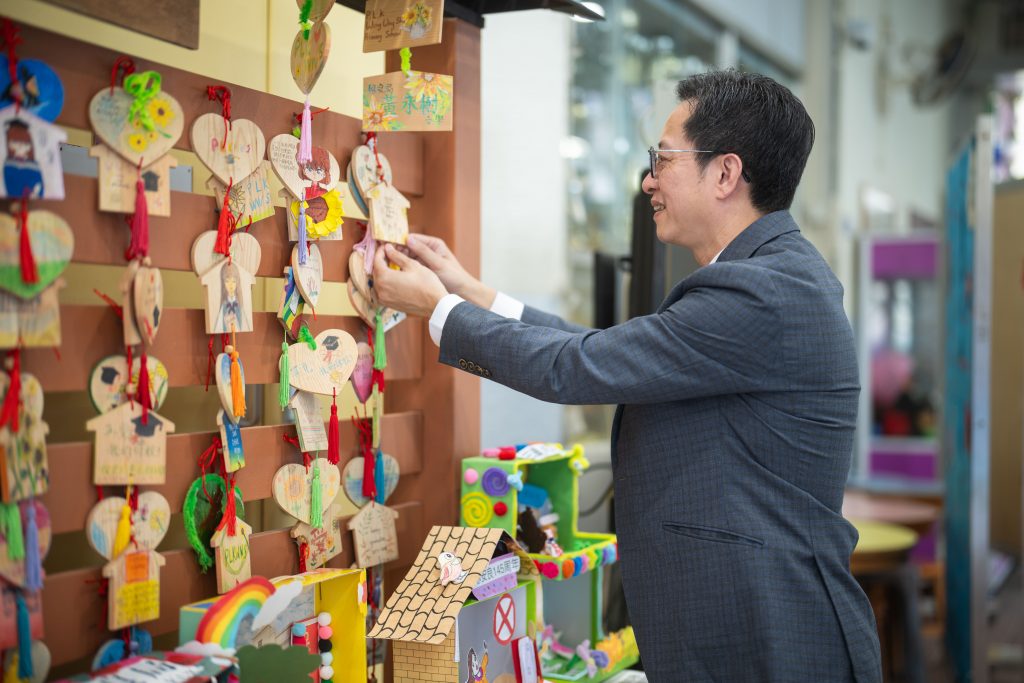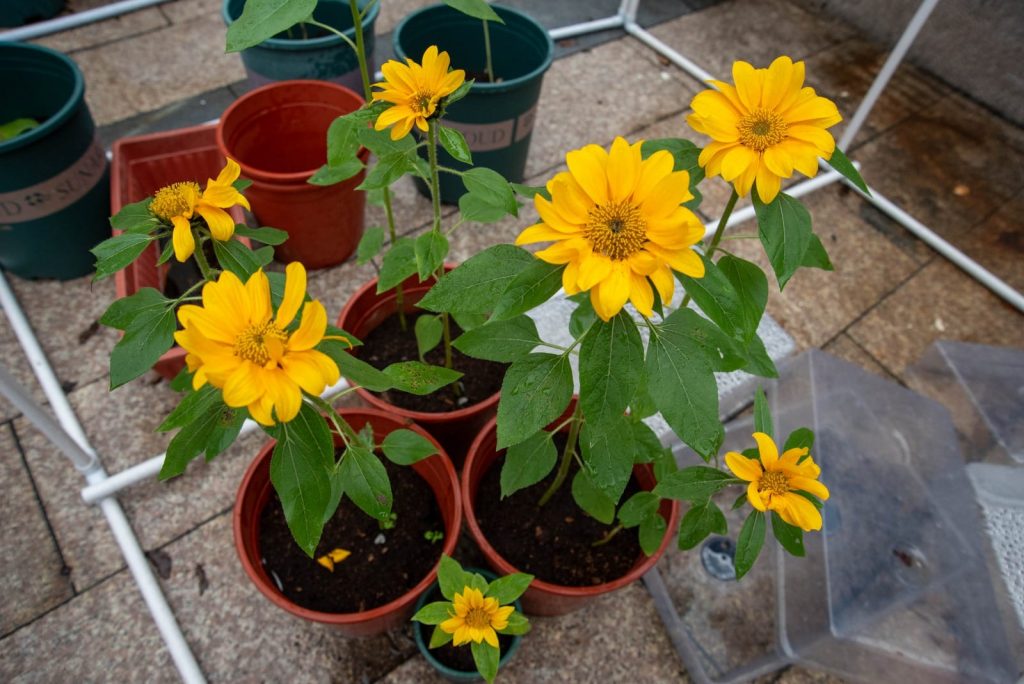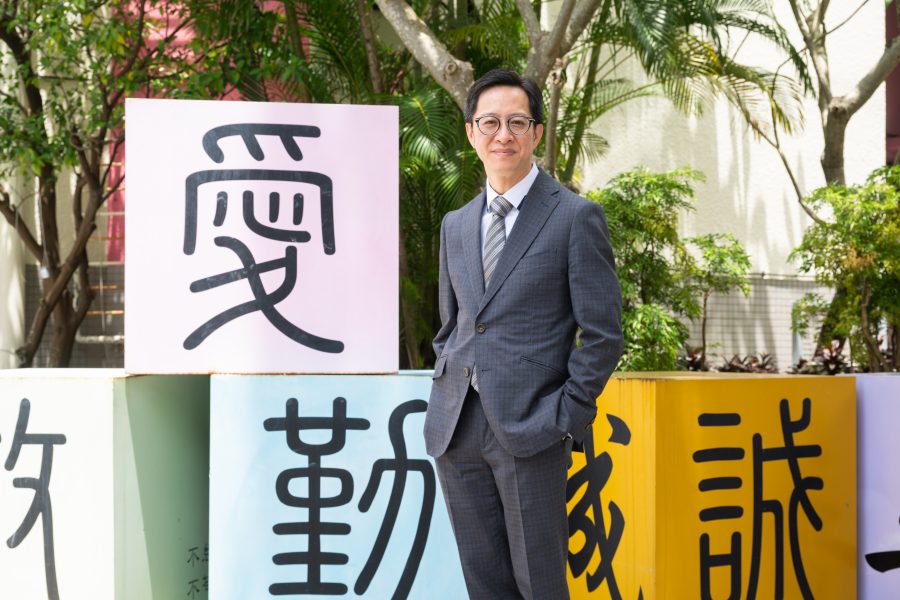Started as a frontline language teacher and then the head of the Chinese department, to working at the Education Bureau, and eventually serving as principal at two different primary schools respectively, Principal Justin Chan of Po Leung Kuk Wong Wing Shu Primary School believes that principals should step back from their own passion for teaching, and focus on discerning what students truly need. Principal Chan shares, “In the past, I prioritised being an excellent teacher, but now I understand it is not just about how well I teach. Education requires tailoring expectations for different individuals – you should not over-impose your personal views, and it is never about how good you are. The focus is and always will be addressing the needs of your school and students.”
Whatever it takes to make school interesting for students
Principal Chan humbly shares that he came from a modest background growing up in a walled village. With limited exposure to novel experiences, all he wanted was to study. After graduating from Lingnan College with a Chinese major, he promptly set his sights on becoming a language teacher – a path he has followed for 29 years. “The job I was most passionate about at the time was a children’s magazine editor. I was deeply interested in children’s literature, and there was such a vibrant array of children’s publications back then. Without the opportunity to break into that field, I was lucky enough to find the silver lining of embracing my teaching career with content.”
Principal Chan worked as a Chinese teacher and a Chinese department head at three different primary schools, amassing 13 years of teaching experience. He wanted to become a curriculum coordinator but was never able to land such a role. In the face of a career plateau, he transitioned to a position supporting language curriculum development at the Education Bureau. Armed with a wealth of curriculum experience, he went on to serve as principal at two primary schools – the first for five years, and then at Po Leung Kuk Wong Wing Shu Primary School for the past six years. Principal Chan admits that he has never been the stereotypical Chinese teacher who merely stands and lectures. “Back then, PE and music teachers were generally more popular among students. As a language teacher, I had to experiment with all sorts of approaches to make my lessons more enjoyable. I even tried teaching my students to write children’s poetry – an idea partly inspired by my own fondness for modern poetry, but also because children’s poetry is fun and less wordy,” he explains.

Evoking a sense of happiness and belonging through on-campus photo spots
Principal Chan has always been passionate about teaching. However, as his scope of work expanded upon joining the Education Bureau, he transitioned from being on the front line to a more supportive role, and eventually became a principal. Over the years, he has gained a deeper understanding of education. “Previously, the Chinese subject was my whole world. Yet, I cannot just focus on academic work in my new role; I must consider the developmental needs of my students from a principal’s perspective,” he reflects. Po Leung Kuk Wong Wing Shu Primary School is a popular and sizeable primary school in Tseung Kwan O, with a total of 30 classes. As an outsider who was parachuted into the role, Principal Chan held off on extensive software and system reforms given the school’s existing academic strengths and the pandemic strike during his second year in position. Instead, he focused his early efforts on observing and acclimating to the school’s culture.
Principal Chan decided to start by making some hardware changes around the school campus. He installed several photo spots for students, including a giant dice displaying the Po Leung Kuk school motto “Love, Respect, Diligence, Integrity, Kindness” at the entrance, a technology-themed wall in the computer room and an ema rack for Primary Six students. The goal was to instil a greater sense of happiness and belonging among students. In addition, Principal Chan pushed for the implementation of more holistic educational initiatives. Before, Po Leung Kuk Wong Wing Shu Primary School had only held inter-school sports days. In Principal Chan’s second year as principal, he secured the opportunity to organise a sports day specifically for his school. He found the teachers and parents to be very pleased with his decision. “The school had never done it before, but I thought it was worth trying. Even though most students seem to just sit in the stands chatting, they really enjoy our sports days. I wanted to bring an unforgettable experience into the school.” Principal Chan believes that since students spend the majority of their waking hours at school, the institution has a duty to ensure they have a joyful childhood. “A happy learning experience can deepen the acquisition of knowledge in students, and foster their resilience and adaptability.”
Principal Chan cherishes the opportunity to interact with his students daily, and insists on greeting them at the school entrance every morning. “I have been doing this since my very first day here. Principals do not get many chances to interact with students – it is mostly just during recess, and we are often too busy to even take breaks. Standing at the school entrance not only allows me to connect with the students but also gives parents easy access to talk to me. They can bring any concerns straight to me, which is good for the parent-school relationship. If the principal never shows up, parents’ grievances may build up over time and become much harder to resolve when they eventually boil over.”
Hard work is the key to success
Principal Chan sees himself as an unconventional principal. Having come from a teaching background, he understands the importance of keeping lessons engaging and lively. In his opinion, both teachers and students need an active, hands-on approach to learning. As such, he actively creates opportunities for experiential learning at school to encourage his students to step outside the
classroom and immerse themselves in diverse life experiences. Among the many activities he has implemented, Principal Chan’s personal favourite is having students grow sunflowers. Sunflowers, in Principal Chan’s eyes, symbolise sunshine, hope, vitality and positivity. He believes the process of plant care constitutes a vital life lesson. Tenderly nurturing the seeds into seedlings, which then bloom into radiant yellow flowers, gives students a profound sense of achievement and ritual. The sunflowers can be gifted to the students’ parents as a gesture of gratitude as well – an important exercise in values education. “To make sure sunflowers thrive on our school grounds, I have done extensive research by reading books, watching tutorials on YouTube and seeking advice from experts. Through repeated experiments, around 80% of students ended up successful in growing sunflowers. The key is to approach the process with love and care, just as parents do in raising their children. We have even had students rush out during class to ‘rescue’ their sunflowers during sudden showers. It may sound radical, but these unexpected teaching moments are invaluable.”

Cultivating sunflowers instils diligence, which Principal Chan values most among the five core values – “Love, Respect, Diligence, Integrity, Kindness”. “I am not the sharpest tool in the shed,” he confesses. “In secondary school, I was ranked around 160th out of 200 students. In fact, I had to take the art stream because I simply was not clever enough for the sciences. I have no qualms about sharing this with my students. Although I was not the most academically gifted, I still found a way to excel through diligence. While I do not possess the charisma of Andy Lau or the talents of Tony Leung, I have discovered that diligence can help us gradually master any skill. At the beginning of my career, I mostly taught elite classes. When I later on transferred to a primary school with more SEN students, I had difficulty in understanding why my students were struggling. I had to start from scratch and do extensive reading to understand SEN students’ unique needs. It took a tremendous amount of effort for me to get up to speed. I am a workaholic who rarely takes holidays – my career is essentially my hobby. Even in the evenings when I get home, I am still reading up on education-related materials. I genuinely enjoy it all.”
The unique “culture of achievement”
Po Leung Kuk Wong Wing Shu Primary School is renowned for its academic excellence, with its secondary school admission rates a major selling point for prospective enrolments. However, Principal Chan is adamant about not publicising these statistics on the school’s website. “While we could get a few more students into top secondary schools, that would come at a cost – we would be neglecting the bottom 20% of our students. Does education really require such a sacrifice? Why should I undermine my students’ future academic drive and enthusiasm just to boost our statistics? This approach will only leave them with a poor impression of learning. Schools cannot simply pursue relentless improvements in academic productivity. We must learn to be content with our successes and focus on supporting our students’ mental wellbeing and managing their academic pressures. As long as we can account for our secondary school placements, there is no need to take undue pride in a 10% increase in Band One admissions. Even Band Two students can go on to remarkable achievements – the most important thing is maintaining all our pupils’ motivation to keep learning.”
In 21st-century education, the focus has shifted towards equipping students with the skills they will need in the future. Noticing that many things and moral boundaries have become increasingly blurred, for instance, slang and trendy language have diluted the Chinese language, Principal Chan believes that it is important to preserve and pass on key traditional values and help students cultivate the right character. Moreover, Principal Chan considers it vital to foster a “culture of achievement” at school, allowing students to experience a genuine sense of fulfilment and success, thereby affirming their self-worth. He shares that “achievement” has several layers of meaning: “First, it is about allowing students to savour the feeling of accomplishment – whether that comes from completing a task successfully, demonstrating their proficiency or receiving praise from others. The second aspect is the satisfaction gained through the process of doing something, but it does not necessarily have to stem from being at the top or becoming a champion. Regardless of the outcome, the mere sense of contentment from having worked hard is a form of happiness. This ‘culture of achievement’ also encourages students to help others succeed, nurturing an altruistic spirit of mutual care, mutual assistance, helpfulness and self-sacrifice for the greater good.”
Principal Chan is a writer who has persistently written articles for his column “Penned Reflections” on his school’s website for the past five years. His column typically covers topics related to parenting and education, with some targeting students as readers too. One distinctive feature of his articles is his ornate writing style. “I intentionally write my articles in a more polished manner, making a conscious effort to draw upon erudite references and rhetorical devices,” he explains. “This is partly to establish a distinct identity for my column, but also because I believe students should read more to hone their writing skills. As such, I quite deliberately ‘over-season’ my pieces, hoping to demonstrate to students the sophisticated techniques and sentence structures they are studying, and how to deploy them effectively. I also want them to see how I have maintained a consistent writing habit through my column, so they can learn that true diligence is measured over years, not days.” Principal Chan has recently initiated the “Writing with Overflowing Love – Happiness Movement”, rallying forces from the community to contribute articles to spur the general public to pay more attention to the mental health of children and adolescents.

